Slow Fiber Studios NEW Hybrid Workshops: The Alchemy of Indigo by Eva-Maria Spampinato
October 20, 2021
Slow Fiber Studios is establishing our pedagogy with new Hybrid Workshops for artists and artisans of all stages in their practice. The challenges of the pandemic brought us a silver lining, prompting us to make a technological paradigm shift. Our masters in France (Michel Garcia) and in Japan (Hiroshi Murase) are working with SFS founder, scholar, artist, Yoshiko Wada to offer online and studio workshops for students in different time zones by facilitating an interactive platform where each student can experience close connection to the instructor and other participants.
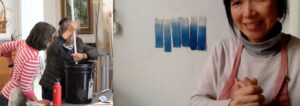
Yoshiko Wada working with students at Slow Fiber Studios Annex and online, Berkeley, California, US.
In our programs, we are going back to the foundations of empirical values in craft traditions. Our aim is to honor dialogue and the exchange of experiential knowledge between students and masters by providing authentic artisan epistemological approaches through observation & experimental studies in our hybrid workshops.
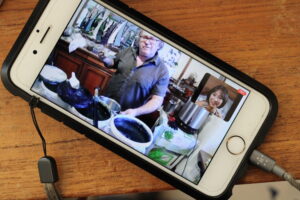
Michel Garcia Indigo Vat Workshop, learning from student’s iPhone.
In collaboration with Michel Garcia, our workshops on persicaria tinctoria and indigofera suffruticosa, we aim to demystify natural indigo by breaking down the colorant’s diverse extraction possibilities. Sourced from Michel’s life work, he delves into various indigo plant forms of dried, fresh, compost, powder, paste, and paint into our new four hybrid workshops. Our courses are inspired and modeled from over ten years of the Natural Dye Workshop film productions with emphasis on sustainable methods, and extensive ongoing research by Michel himself.
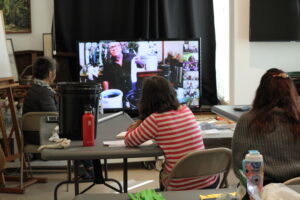
Michel Garcia, Yoshiko Wada and students at Slow Fiber Studios Annex, Berkeley, California, US.
Earlier this year, we offered three opportunities to study Indigo Vat at your Home, exploring the basic concept of what an organic indigo vat is by utilizing Michel’s Indigo 1-2-3 method, now widely adapted by all instructors of natural indigo dyeing. This is a gateway to foundational knowledge of indigo vat-making, sustaining the vat, and dyeing to understand its chemical reaction.
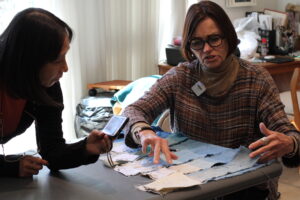
Student shares her experiments with Michel Garcia and participants online, at Slow Fiber Studios Annex.
Michel establishes his pedagogy in this course by positioning the crux of knowledge between basic chemistry and empirical values for the student. He emphasizes that it is essential to adopt the nature of inquiry for any learning experiences through observations to engage new perspectives utilizing all senses of sight, smell, taste, touch, hearing while interacting with indigo and the vat. It is critical to understand in one’s practice making any natural dye and pigment is qualitative, do not attempt to be a chemist, rather be an artisan and be curious. “What messages is your indigo vat trying to convey to you at any given moment?”
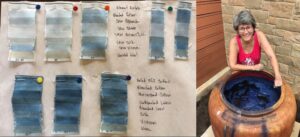
Indigo 1-2-3 Vat Workshop, student Deb Luce McClintock shares her experiments and vat for online discussion.
In the summer, we introduced a unique session called: Indigo Lab: Consultation for those who participated in the previous hybrid workshop to ask questions, share experiments, and exchange their trials and errors. Through this platform, the students learned immensely from others’ practice that covered a wide variety of issues. Michel also reviewed the basic 1-2-3 vat making process with fructose, showed the alternative vat-making using natural henna powder, and liquid for madder roots soak to demonstrate the various approaches but utilizing the same principle.
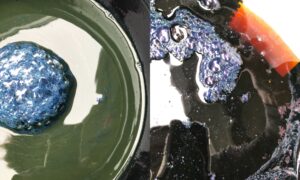
Student shares their healthy indigo dye vat and Michel Garcia discusses indigo chemical reaction online.
SFS introduced Indigofera Dried Leaves: Extract Fresh Indigo Pigment, Make your own Watercolor Paint & Dye Vat workshop, demonstrating a rare method Michel discussed in the NDW IV: Beyond Mordants (2018). Michel focused our workshop on how this innovative method using dried indigo leaves really uses all stages of indigo colorant extraction, requiring less water, time and labor. In collaboration with Stony Creek Color, a sustainable natural dye company in Tennessee, we use a dried indigofera powder in our workshop that is traditionally used as hair dye in many cultures.
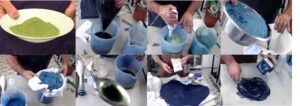
Michel Garcia teaches step-by-step how to extract indigo colorant from dried leaf to dye and pigment.
Our fourth course, Indigo: Perscicaria Tinctoria, Dried Leaves for Dye Vat, Fresh Leaves Extract & Compost for Quick Vat, is for those who love persicaria tinctoria and for many who grow the plant. Michel explores persicaria by demonstrating how its dried leaves can start a dye vat, he showed a water extraction method to obtain indigo colorant from fresh leaves, and how to make a quick dye vat using compost (sukumo), the antithesis of the long traditional Japanese method. A bonus to our program, the Bhutanese project for sustainable craft production, contributed dried strobilanthes cusia leaves, grown wild in Bhutan for Michel to experiment with dye vat making.
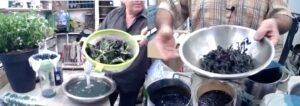
Michel Garcia demonstrates colorant extraction from fresh and dried leaf in Indigo: Persicaria Tinctoria workshop.
Our fifth workshop, Indigo Alchemy, is offered this coming Saturday, October 23rd as an extension of August’s Indigofera workshop which was very popular as it extends the indigo practice to make your own dye extraction easily from using traditional hair dye, and to make indigo pigments for painting. Michel will expand the workshop to teach the once-enigmatic maya blue pigment and its use to color paper pulp.
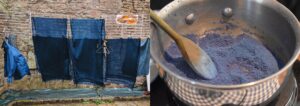
Left: Michel Garcia’s home when filming Natural Dye Workshop IV, 2018. Right: Eva-Maria Spampinato, Color Transmutation: The Alchemy of Maya Blue, 2019.
The SFS workshops aim to expand the 21st century mind to access ancient wisdom by reintroducing the roots of craft knowledge from the worldwide, this is called artisan epistemology, a universal language. This experiential and sensory knowledge is transcultural and we believe it’s time we reconnect to our inner potential again.
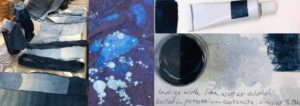
Student work from SFS Hybrid Workshops 2021, Indigo 1-2-3 fiber tests, indigo textiles experiments, and indigo homemade paints.
- To register for our Slow Fiber Studio Hybrid Workshops and previous recordings, they are available to purchase.


